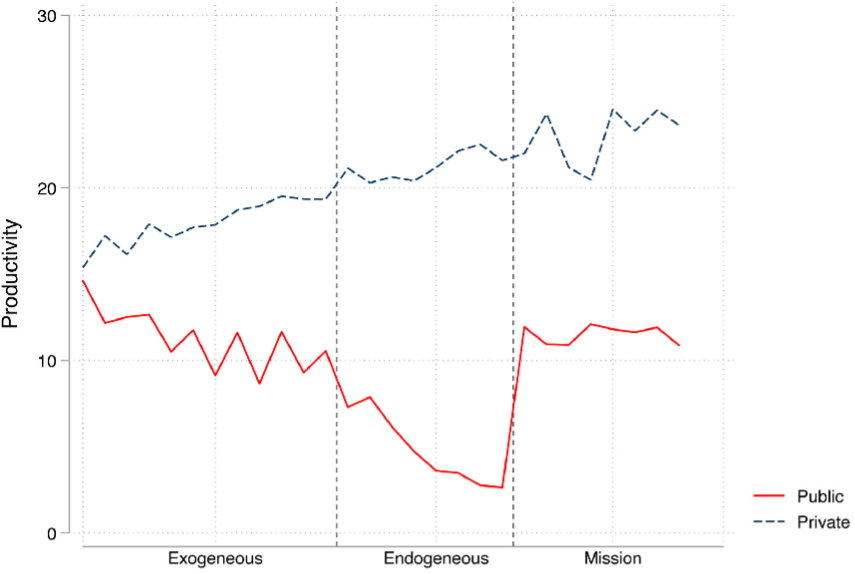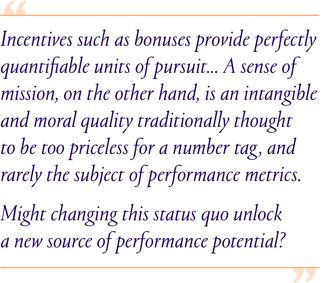Incentives or company mission: Which one outperforms in terms of driving employee productivity?
Diverse businesses incentivize their workers in various ways. Some firms offer bonuses to reward employee performance. Others, most commonly non-profits and public sector companies, appeal instead to workers’ internal motivations by projecting a sense of higher moral purpose.
But what ends up winning the day? Is it bonuses or mission? Traditionally, monetary incentives are thought to play a particularly crucial role in concentrating productivity in the private sector by both attracting higher-quality candidates and motivating employees to work longer and more productive hours. But a study recently published in the Journal of Behavioural and Experimental Economics was one of the first to subject this idea to a rigorous test, and to pit money against mission in an experimental laboratory setting.
In this study, 70 participants were asked to complete multiple 90-second rounds of a so-called slider task (the experimental and time-compressed equivalent of a job). A large number of images were scattered across the screen in front of them, and participants were asked to use a computer mouse to slide as many of them as possible towards the center within each 90-second window.
In the ‘exogenous’ phase of the experiment, individuals got to sample working in simulated ‘private’ and ‘public’ sector settings on different rounds by being allocated to receive either performance-based renumeration (contingent on how many slides they end up completing in each round) or a higher base wage that was nonetheless insensitive to performance.
In the next, ‘endogenous’, phase of the experiment, participants could choose the sector they would prefer to work in for the remainder of the game. This allowed the scientists to assess the hypothesis that private sector environments, with their variable reinforcements, attract higher-quality talent.
Indeed, their findings offered support to this belief, as participants with higher average productivities (measured during the exploratory phase of the experiment) tended to choose working for simulated ‘private’ firms. They also spent more of their time choosing to carry out their task as opposed to opting for less demanding, but also less rewarding, leisure. This was measured by offering participants the chance to temporarily opt out of the slider task at any point within a round in exchange for giving up the majority of their renumeration for that period.
The evident power that variable reinforcement, long praised by behaviourists since the 1940’s, has to motivate performance should not be all too surprising. But as the authors of this new paper discovered, a sense of mission can do much to offset the private-public gap in productivity brought on by the sectors’ differing reward systems. Their experiment mimicked this by offering participants their choice of charity to receive donations based on their task performance – a change that triggered a substantial boost in work efficiency in public sector ‘employees’ and narrowed the public-private gap.
These effects certainly point to the enormously untapped human potential that comes from infusing one’s organization with a sense of higher purpose. Nonetheless, mission’s inability to override the motivating power of performance-based monetary incentives – as evident in the remaining public-private gap in productivity – does raise questions about the nature of this discrepancy.
As behavioural scientists, we are tempted to speculate that the ‘incentive versus mission’ differential at least partially boils down to an inherent difference in quantifiability. If there is anything to be learnt from the decades of lab experiments on the behavioural effects of reinforcement, it is that individuals are exquisitely sensitive to the magnitudes of their rewards. The difference between five and twenty units of reward (be they chocolate chips or dollar bills) is sufficiently straightforward to track that animals – from pigeons and rats to human beings – can scale the effort they are willing to expend for their rewards, or else decide whether they are worth the requested effort altogether.

In light of this, incentives such as bonuses provide perfectly quantifiable units of pursuit, with the additional motivating factor of being obscured by a slot machine-like shield of probability (after all, employees are never quite 100% certain that their efforts will receive that extra payoff). A sense of mission, on the other hand, is an intangible and moral quality traditionally thought to be too priceless for a number tag, and rarely the subject of performance metrics. Might changing this status quo unlock a new source of performance potential? We dare say that exploring this possibility in a laboratory setting would be an exciting next step for behavioural researchers and economists.
In the meantime, recent research suggests that the performance-enhancing benefits of mission are far from limited to companies providing public goods. Private sector firms exhibit higher profits when their workers feel their work is meaningful. So if you’re curious to think about ways you might find or strengthen your firm’s own sense of purpose, we encourage you to check out the case studies explored in our annual report (link attached to ‘report’) to see the steps already taken by industry leaders across the globe.
REFERENCE
Ravid, O., Malul, M. & Zultan, R. (2021). Incentives, mission and productivity. Journal of Behavioural and Experimental Economics, 91: 101668.










